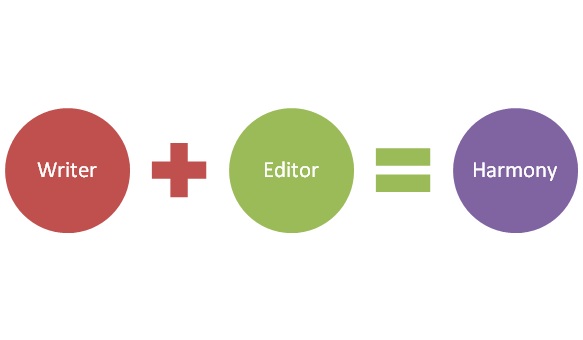Search
Latest tweets
Latest tweets
- No public Twitter messages.
Top 4 Tips for Writers
Posted in: Blog, Copyediting by Sally Evans-Darby on 4 May 2012

How to Get Along With Your Editor
Why you should treat your editor as a fellow comrade, not your worst enemy
Editors are grumpy, difficult people. They’re your primary school teacher incarnate, nitpicking all your errant commas and slapping your wrist for using a split infinitive. They probably tried to be a writer themselves, once, but failed; so now live out their frustrated dreams by telling real writers what to do. They’re likely to make a pig’s ear of your carefully arranged prose by splitting up sentences and replacing your favourite adjectives with simpler synonyms. Right?
Unfortunately, this is how many writers often see editors. Of course, in a good editor none of the above would be remotely accurate. But impressions such as these are what can sometimes make the relationship between writer and editor fraught with tension.
Writers, here are my top four tips for removing that tension and making your writer-editor partnership work for you.
1. Keep communication lines open
Communication is key both for writers and editors. From the word go, talk to your editor, liaise with them, make the communication lines clear. Be available and transparent and they will in return. Answer queries promptly. Don’t go AWOL. Realise that you writing the piece and sending it off to be edited is, generally, not the end of the process. You may need to work in conjunction with your editor to rewrite passages, or to review their work if they are doing the rewriting.
Also it should go without saying that the level of work required should always be set out clearly with the editor before they begin work. Agree payment, deadlines, the level of edit required and so on, and then hand over for editing to begin.
2. Understand why your work is being edited
Realise that all written work will need to be edited or at least proofread in some way. You are not being singled out. Your piece might be brilliant, incisive, artistic – but it will still benefit from a fresh pair of eyes. The more emotionally invested you are in a piece of work you have written, the more it needs an editor. This is because you are too close to it and you won’t be able to perceive flaws that to the reader may be glaringly obvious.
An editor provides you with that fresh pair of eyes, but not just any pair of eyes – a pair of eyes and a brain that have been meticulously trained in the very precise skill of editing. They know what to look for, and they know how your audience is going to see your piece. Remember that the editor’s aim is not to alter your work for the sake of it, but to polish it and make it the best it possibly can be for its intended audience.
3. Leave defensiveness at the door
It’s so easy, as a writer, to get defensive about what you have written. However thick-skinned you are, and however well you generally think you can take criticism, the smallest perceived slight against your creation can make you grit your teeth in resentment.
A Word document that is returned to you covered in unsightly Track Changes can make your hackles stand on end, ready to argue against anything your editor suggests changing. Their polite suggestion that a Dickens-esque sentence could be simplified can seem like a huge blow to your writerly ego if you take it too personally.
It’s really important to try and take a step back in this situation and see your work dispassionately. Treating the writer-editor relationship like a power struggle isn’t helpful for anyone. Realise that editors have the best intentions at heart for your work and they are here to help, not harangue.
4. Editors are fallible; so are you
Finally, a note about fallibility, both of the writer and the editor. The editor does not know everything. They are not descending from on high to lecture you on participles and gerunds. They sometimes make mistakes. You sometimes make mistakes. You are both human. Try and get along.
